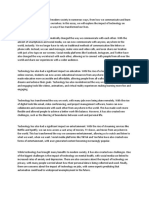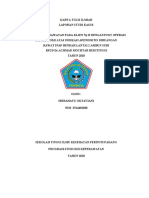0% found this document useful (0 votes)
30 views2 pagesThe Impact of Technology On Society
The document discusses the profound impact of technology on society, highlighting both its benefits, such as improved communication, healthcare, and education, and its challenges, including job displacement and privacy concerns. It emphasizes the need for responsible innovation and ethical considerations as technology continues to evolve. The conclusion stresses the importance of leveraging technology to enhance lives while addressing its negative effects for sustainable progress.
Uploaded by
muhammedshamaas2008Copyright
© © All Rights Reserved
We take content rights seriously. If you suspect this is your content, claim it here.
Available Formats
Download as DOCX, PDF, TXT or read online on Scribd
0% found this document useful (0 votes)
30 views2 pagesThe Impact of Technology On Society
The document discusses the profound impact of technology on society, highlighting both its benefits, such as improved communication, healthcare, and education, and its challenges, including job displacement and privacy concerns. It emphasizes the need for responsible innovation and ethical considerations as technology continues to evolve. The conclusion stresses the importance of leveraging technology to enhance lives while addressing its negative effects for sustainable progress.
Uploaded by
muhammedshamaas2008Copyright
© © All Rights Reserved
We take content rights seriously. If you suspect this is your content, claim it here.
Available Formats
Download as DOCX, PDF, TXT or read online on Scribd
/ 2











































































































